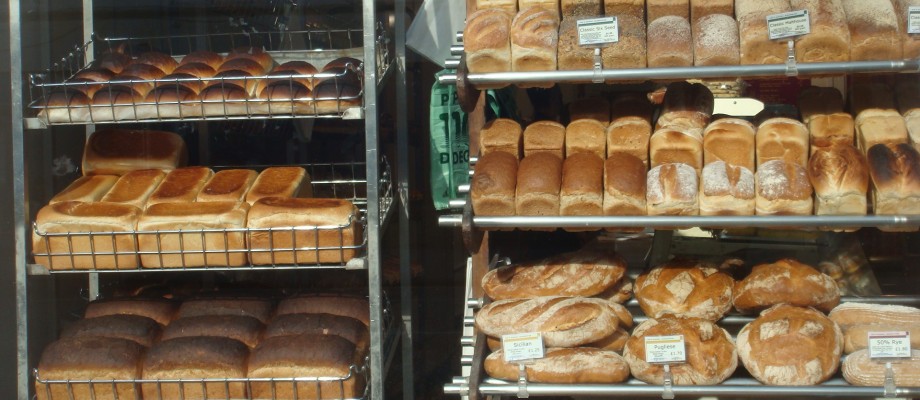HOW TO BAKE A GINGERBREAD GIRL by Emma Simon
Paint blue icing on her fingertips,
fingers that could snap with cold,
dipped into fridges and glass chillers
placing cockleshell cakes in pretty rows.
Tie back her hair, dress her in sexless tabards,
dab with jam. Press glacé cherries on her cheeks
when delivery men proffer French stick bouquets
with winked asides about what’s just risen and
is fresh enough to eat. Make her strong:
by fifteen she’ll haul a tray of farmhouse loaves,
guide bread through slicers without alarm.
Let Saturdays fly from the shelves
in a blitz of crumbs, the dirty grit of sugar.
Knead into her the 28 times table,
that baker’s trick of twisting a paper bag closed
so it holds intact delicate layers of hope.
Leave her to prove herself on moonlit mornings,
December nosed to the window,
side-by-side with other gingerbread girls,
tea cupped in frosted hands, backs to the warming oven.
There aren’t enough poems set at a workplace. That’s one aspect of this poem’s appeal – we’re put right there in the bakery, hauling bread or doing mental arithmetic, getting warm after winter’s early starts or arranging cakes in the chiller. All this sweet stuff is hard work, vividly described in just 20 lines. Not that we know where we are at the beginning; though line 2 gives a clue with those snappable fingers, it’s not until the second verse that the gingerbread girl comes to life like a statue in a fairy-tale. The metaphor’s well maintained and used to suggest that the girl (and she really is a girl, barely in her mid-teens) is maturing, “leave her to prove herself”, doing that teenage thing of waiting to become grown-up though time (those Saturdays) is flying.
Jobs help you learn about life. The gingerbread girl is on show in the shop despite the “sexless tabard”; she’s also becoming competent at maintaining the show of the shop. Beyond the blush we’re not told how she feels about the delivery men’s phallic jokes, whether she finds them utterly obnoxious or mildly embarrassing, or perhaps it depends on which delivery man’s doing the joking. We’re left to imagine these possibilities.
The poem’s very loosely presented as a recipe and the couplets work for that, giving the impression of a list of instructions. The imperative tense adds freshness of perspective to what could have been a straightforward, less striking autobiographical poem.
Let Saturdays fly from the shelves
in a blitz of crumbs, the dirty grit of sugar.
That’s the hard work and speed of a Saturday evoked in few words. The short i’s of “in a blitz… grit” suggest the scattering of the day’s detritus. (More short i’s appear, icily, in line three of the poem.) Then there’s this:
that baker’s trick of twisting a paper bag closed
so it holds intact delicate layers of hope.
Those two lines have to be said slowly out loud. The first one’s almost a tongue-twister with “trick of twisting” and “baker’s… paper bag”. In the second, the strong caesura at “intact | delicate” and the precise sound of the t’s and c’s convey the airiness of the cakes, the bags and hope. The long o’s in “closed… holds… hope” bind the couplet together. Such effects suggest a good instinctive ear for language. Line breaks are nicely judged, going mostly with the sense except for the joke in verses 4-5.
The final couplet broadens the perspective, perhaps with a hint of nostalgia – the poem becomes universal when the gingerbread girl becomes plural, all of them proving as they enjoy the warmth of oven and tea.
Fiona Moore
Photo: Joe’s Bakery, Bristol






